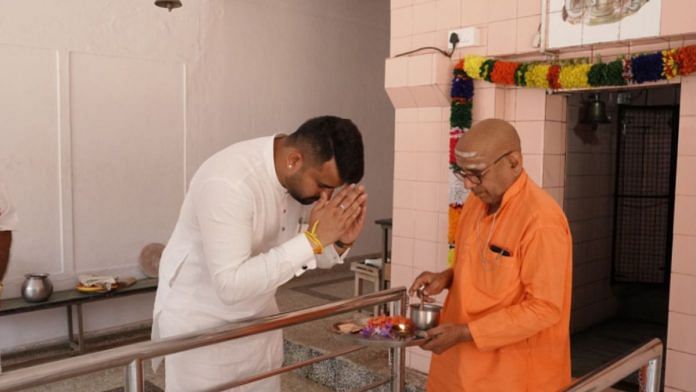New Delhi: The use of a diplomatic passport by suspended Janata Dal (Secular) leader Prajwal Revanna, amid allegations of sexual abuse, has raised questions about potential protocol violations. This comes a day after the Ministry of External Affairs (MEA) confirmed Thursday that Revanna, the grandson of former prime minister H.D. Deve Gowda, is in Germany and travelled on a diplomatic passport without seeking political clearance from the ministry.
Revanna flew to Germany after the first phase of Lok Sabha polls in Karnataka on 26 April.
Members of Parliament are entitled to a diplomatic passport besides a normal one. This maroon-coloured passport comes with certain privileges, including immunity from arrest in a host country and special access to diplomatic channels and services provided by Indian diplomatic missions abroad.
However, a Parliament Bulletin issued by the Rajya Sabha Secretariat on 30 January 2023, clearly states that, when using a diplomatic passport, MPs have to get political clearance from the MEA before proceeding abroad. Such requests may be made at least three weeks in advance. This rule also applies to private visits abroad, such as tourism or visiting friends and relatives.
A diplomatic passport also allows its holder visa-free entry to various countries that have special agreements with India. Germany is one such country.
ThePrint explains the difference between a diplomatic passport and an ordinary one, how it can be revoked and what visa rules and regulations apply.
Also Read: Prajwal Revanna case shows politicians don’t care about women’s safety. They are the culprits
What is a diplomatic passport?
A diplomatic passport, categorised as ‘Type D,’ is issued to Indian government officials or diplomats who travel abroad for official purposes. Officials at embassies, high commissions and other Indian missions usually carry this passport. However, MPs are also entitled to them.
The Consular, Passport and Visa (CPV) Division of the MEA is responsible for issuing these passports to government officials who travel abroad for official assignments or visits.
Unlike the standard dark blue cover of ordinary passports, diplomatic passports feature a maroon cover, not to be mistaken for the white official passport designated for government officials on official business. It is arguably the most powerful passport that an Indian official can carry.
The validity of diplomatic passports is typically five years or less, depending on the holder’s position and the nature of their assignment or visit. This is unlike an ordinary passport that is valid for 10 years (adults) or 5 years (minors).
Moreover, diplomatic passport holders enjoy certain privileges that ordinary holders don’t. Their immigration formalities upon arrival in a foreign country are fast-tracked. Also, they may not need to acquire a visa note from the MEA if they are travelling to one of the 34 nations with which India has ‘Visa Exemption Agreements’. These agreements are reciprocal.
Finland, France, Germany, Spain, Kenya, Japan, and Iran are among the few nations that allow Indian diplomatic passport holders to visit without a visa note and vice-versa.
The period of stay under this exemption varies from 30 to 90 days, depending on the country. For example, Afghanistan and Turkmenistan allow a 30-day visa-free stay to diplomatic passport holders, while Uzbekistan allows 60 days and Germany, Finland, France and a majority of other nations on the list permit 90 days.
When is a diplomatic passport revoked?
On Wednesday, in a letter to Prime Minister Narendra Modi, Karnataka Chief Minister Siddaramaiah asked the government to cancel Prajwal’s diplomatic passport. MEA spokesperson Randhir Jaiswal said Thursday, that a direction should come from a court to revoke a person’s diplomatic passport. “So far, we haven’t received any such direction from any court,” he added.
According to Section 10(3) under the Passports Act, 1967, the passport authority may impound or revoke a passport on various grounds, including if the holder is in “wrongful possession” of the passport; has been convicted by an Indian court for any offence and is sentenced to imprisonment for not less than two years; and if any proceedings against the holder are “pending before a criminal court” in India.
Currently, an investigation by the Special Investigation Team against Prajwal for alleged sexual harassment is underway. “The investigation will proceed. After that, appropriate action will be taken,” the MEA spokesperson said Thursday when asked if Prajwal broke protocol by not seeking political clearance for his travel.
Prajwal and his father, JD(S) MLA H.D. Revanna, have been booked under IPC sections 354A (sexual abuse), 354D (stalking), 506 (threat) and 509 (insult caused to the modesty of a woman). Further, they have been asked to appear before the SIT for investigation.
The Passports Act also mentions that the passport authority has the power to cancel a passport if a warrant or summons for the appearance, or a warrant for the arrest, of the passport holder has been “issued by a court under”. This may also apply if there is a court order “prohibiting” the passport holder’s departure from India.
A passport may also be impounded or revoked if a court has convicted the passport holder of any offence under this Act. An order of revocation may be made by an appellate court or by the High Court.
(Edited by Richa Mishra)
Also Read: ‘Didn’t give clips to Congress’ — Prajwal Revanna’s ex-driver claims he gave pen drive to BJP leader



